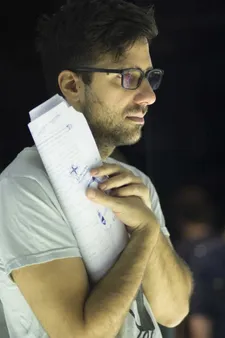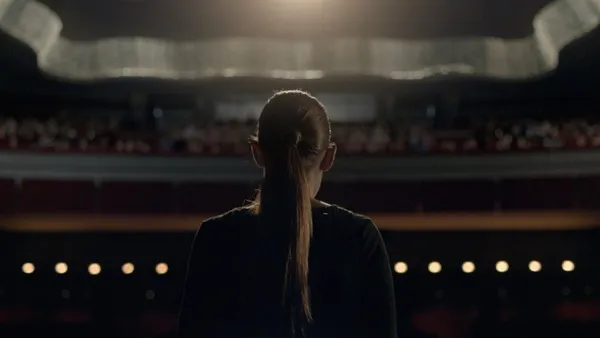Yorgos Zois' debut feature Interruption is set within the confines of an Athens theatre and stars Alexandros Vardaxoglou, Maria Kallimani, Alexia Kaltsiki, Christos Stergioglou, Maria Filini. Midway through a performance, a group of gunmen take the stage and bring members of the audience up alongside them. They begin to direct a different sort of action, so that the lines of fact and fiction start to blur, both for those who have come up onstage and the others who remain watching in the auditorium. We spoke to Zois after his film had premiered in the Orrizzonti section of Venice Film Festival, where it is also available online as part of the Sala Web.
AW: Shakespeare said, 'All the world's a stage', but in your film it is more a case of you putting all the world on the stage - in the form of a mix of audience members - perhaps you could tell us a bit about the art and artifice that you use in your film. And do you think we should 'choose' our roles in society more carefully?
YZ: I wanted to create an original cinematic world that the viewer could use all his senses and experience a journey to an unmapped world that blends the limits between life and art, fiction and reality, logic and absurdity. A cinematic enigma that offers no single solution but offers you the chance to see a different view each time you look through a different keyhole. The most obvious artifice that I used was the general shots from the point of view of the theatre audience. My purpose was to create a streamlined continuum of dark seats spreading from the cinema seats of the actual movie theatre to the dark seats of the fictional theatre. And in the premiere of the film, the audience felt it; you could look at the picture and you could see hundred of people sitting in from of you, in real life simultaneously with the screen. Moreover we were hearing sounds like coughs and no one could not realise if they were coming from the audience of the theatre or from the sound design of the film. It felt we were all one, like the audience of the theatre was merged with the audience of the cinema.
AW:The theatre that you use becomes almost a character in the film itself, what venue did you use and how difficult was it to find it?
YZ: We used a luxurious theatre in the centre of Athens. Until few days before the shooting, the contracts among the production company and the administration of the theatre had not been signed and no one really knew if we would make the film or not. So it was not only difficult but it lead to an existential and body breakdown, working years for the preparation of this film and just a few days before, to realise that there was absolutely no guarantee that the film would be made. Finally we were allowed to enter the theatre only three days before the shoot and with such strict deadline that the assistant director said the film could not be made. So it was not only difficult to find it but also extremely crucial and harsh to complete it. But all this unproductive pressure turned into an extraordinary collective power from cast and crew to make the film happen. And this is my personal catharsis.
AW: You take a very stripped back approach to the staging and the shooting of the film, particularly making those on stage look 'blurred'. Could you tell us a bit about that aesthetic and the challenges of turning a staged performance into something more cinematic?
 |
| Director Yorgos Zois: 'It was not only difficult but it lead to an existential and body breakdown' |
AW: You are clearly interested in what it means to 'be an audience' and the blur between the lines of fact and fiction. You also play around with the cinema audience's viewpoint, cutting away to small screens sometimes during the action, so that we become acutely aware of the fact we are watching a performance. What inspired you to explore this idea and are you hoping that your cinema audience will question the way they view things in future as a result?
YZ: I think I always had a fear of belonging to a massive audience that steals my identity. And at the same time, as a kid, I always acted into an imaginary world and sometimes I really couldn't distinguish imagination and reality. Growing up, I also realised that storytelling was a tool from power to manipulate people; mixing fiction with reality to its own advantage. As far as your second question, I never hope because hope always makes you suffer even more and be patient with exterior manipulations and misleading assumptions for your life that you should have already interrupted. But my wish for art is to feed a tiny seed in people minds that might grow up and, who knows - if some of the people who see this film challenge also the way they perceive reality that would be tiny miracle? Just imagine for one second if this whole story would happen for real and you were a member of the audience; when later you would return to your place and hear the news, you would realise that all this happened for real all the time you were inside the theatre. If this would have happened to me, I would totally mentally collapse. After that I would redefine my whole existence.
![Zois: 'I was always questioning myself [about the fact] I chose a film set inside a theatre to be my first feature'](/images/newsite/Stage-Fright-880x495_225.webp) |
| Zois: 'I was always questioning myself [about the fact] I chose a film set inside a theatre to be my first feature' |
YZ: If this film was a documentary, it would be called: The Act of Acting. This is also a topic of the film; how we act and react if we are assigned roles by an authority. And in this film, you just hear the authority, somewhere hidden in the dark audience. And as we all know, there is always a voice, inside or outside of us, that guides us what to do. Sometimes its called power, system, religion, ideology, boss, sergeant, family. But there is always a “director” that gives us stage directions. When the director happens to be us, then its a bless or another deception.
AW: The motivations of the 'chorus' who take over the stage in your film are left unspoken. They are as much a mystery to us at the end as they are at the beginning. Why did you make that choice?
YZ: The Chorus produces a statement which for them is a matter of life and death. Their only ideology is in narrative form; it's the myth. They act as hijackers of the play; they seize control of the play and lead it towards a new direction. If you have noticed, the play is interrupted when Cassandra says: "Offspring will come from very far away for revenge…" So for me they have one clear motive and this is revenge. In my point of view, they don't carry message through their actions; their actions is the message. But at the same time, just like everything that comes and goes, is a mystery. And mysteries are not to be rationalised, but to be experienced.
Interruption is available to watch until September 13 on Sala Web - which is screening 15 films from the Venice Film Festival, priced 4 euros each or 2 euros each if you buy a pass to see five or more.






















